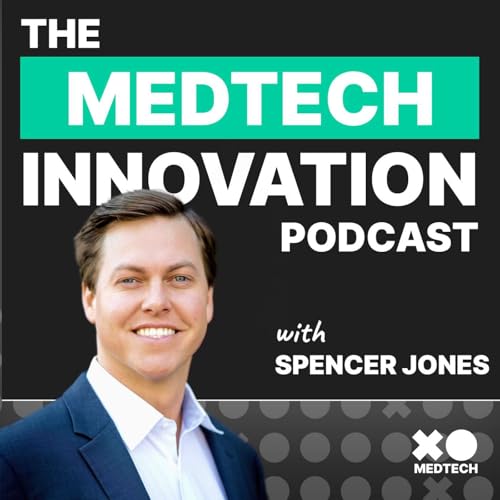I'm joined by Serge Kadjo, Founder & CEO at Wearer Lab dba Productflo.io, as we explore how AI-powered design tools are revolutionizing hardware development and compressing the medtech innovation cycle.
From African Robotics Dreams to Global Hardware Innovation
→ Serge's journey spans West Africa, military service, and multiple continents (Poland, China, Morocco, France) with exits in smart agriculture and deep tech, culminating in Product Flow's mission to democratize hardware development
→ His multidisciplinary background across IoT systems, BCI neurotechnology (partnered with CERN), and medtech sleep devices informs Product Flow's systems-thinking approach
Haitch: The AI Design Engine Transforming Ideas Into CAD
→ Haitch converts text prompts or engineering drawings into parametric 3D CAD models in minutes, generating complete design briefs with DFM analysis, dimensions, and manufacturing constraints automatically
→ Real application: Serge took a client's screenshot, prompted Haitch to design sliding mechanisms, generated three options with exploded views, and produced manufacturable CAD files conversationally
Product Flow: Breaking Down Engineering Silos
→ Consolidates mechanical files, PCBs, code repositories, and drawings into one version-controlled workspace, enabling 75-80% faster development through unified visibility
→ Generates dependency trees showing how functions, components, and tasks interconnect—critical for complex systems like drug delivery devices with mechanical, electrical, and software components
The AI-Academia Application Gap
→ NVIDIA's ML simulation engines perform FEA 10x faster, yet medtech domain experts remain unaware these tools exist because researchers and practitioners occupy separate worlds
→ Transit/ship testing and EO residuals involve known variables that computational models could simulate, potentially compressing 3-month, $40K validation cycles into days
Security and the Zero-Trust Framework
→ Never trust AI providers even when they claim not to train on your data—design systems assuming they might, especially since legal obligations require permanent data storage
→ Product Flow decoupled the AI engine from collaboration—teams use file sharing without AI, then selectively enable Haitch for generation tasks
Why Hardware Takes 4 Years and $4M
→ Companies spend equal time on every phase instead of using AI to compress the middle 70% of grunt work, preserving human expertise for critical first 10% and final 20%
→ Tools like Haitch for rapid prototyping and computational validation could cut development timelines and costs by 50-60%
Best Quotes:
"Building hardware is more about design system thinking. Break products into functions, tools, and solutions—you're way more able to communicate and collaborate."
"There's a barrier between AI research and real-world application. Folks with domain knowledge don't know how to apply ML. They're not even aware those models exist."
"We're in a wonderful era. The limits are on your imagination. Lower expectations at first, but try it—you'll be surprised."
Want more insights on medtech innovation?
Subscribe so you don't miss hot takes and insider tactics from the trenches of medtech startups.
🤝 Join the #1 network for medtech innovators. Become a member to accelerate your journey: https://www.xomedtech.com
Connect:
Serge: https://www.linkedin.com/in/swkkadjo/
Product Flow: https://www.productflo.io
Spencer: https://www.linkedin.com/in/spencer-jones-xo/
Timestamps:
0:00 - Serge's global innovation journey
5:45 - Smart agriculture, BCI/TDCS ventures
14:15 - Product Flow and Haitch introduction
22:05 - Security and zero-trust framework
28:45 - Haitch demo: engineering drawings to CAD
36:20 - Product Flow: version control demo
42:10 - AI-academia gap in medtech
49:00 - Compressing timelines: 4 years to 18 months
54:15 - Computational validation models
1:00:25 - Final thoughts on imagination
 Jan 27 20261 h y 1 m
Jan 27 20261 h y 1 m Jan 20 20261 h y 6 m
Jan 20 20261 h y 6 m Jan 8 202642 m
Jan 8 202642 m 1 h y 15 m
1 h y 15 m 1 h y 3 m
1 h y 3 m 1 h y 30 m
1 h y 30 m Jul 23 20251 h y 24 m
Jul 23 20251 h y 24 m Jul 9 202535 m
Jul 9 202535 m
